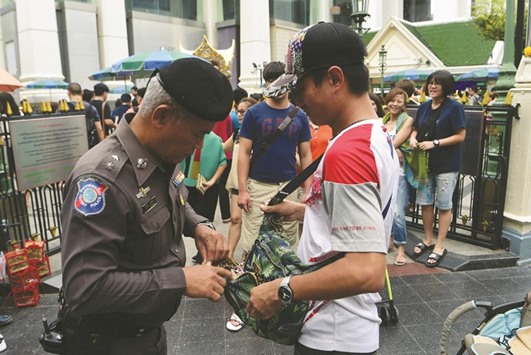-
Tips for becoming a good boxer - November 6, 2020
-
7 expert tips for making your hens night a memorable one - November 6, 2020
-
5 reasons to host your Christmas party on a cruise boat - November 6, 2020
-
What to do when you’re charged with a crime - November 6, 2020
-
Should you get one or multiple dogs? Here’s all you need to know - November 3, 2020
-
A Guide: How to Build Your Very Own Magic Mirror - February 14, 2019
-
Our Top Inspirational Baseball Stars - November 24, 2018
-
Five Tech Tools That Will Help You Turn Your Blog into a Business - November 24, 2018
-
How to Indulge on Vacation without Expanding Your Waist - November 9, 2018
-
5 Strategies for Businesses to Appeal to Today’s Increasingly Mobile-Crazed Customers - November 9, 2018
Dead- Bombings At Thai Tourist Sites
The latest troubles began Thursday afternoon, when a bomb exploded in the southern province of Trang – an area full of beaches and tourist islands – killing one person and injuring six, according to police.
Advertisement
In hardest-hit Hua Hin, a popular beach resort far from the conflict zone that was rocked by four bombs, locals said they were fearful the town’s mainstay tourist industry would suffer just ahead of peak season. One Thai woman was killed and about 20 people were wounded.
Royal Thai Police Colonel Krisana Patanacharoen said the bombings followed “a similar pattern used in the southern parts of the country” – a reference to a low-level insurgency in the country’s Islamic south that has ground on for more than a decade and killed more than 5000 people.
In a televised address on Friday, Thai prime minister Prayuth Chan-ocha said the attacks “struck at the hearts of all Thai people”. “From now on, please help keep an eye on the situation, and arrange volunteers in your area to monitor all important places as well as tourist attractions in every province”. Thai authorities said that bombing was revenge by a people-smuggling gang whose activities were disrupted by a crackdown, but analysts suspect it might have been the work of Uighur separatists angry that Thailand forcibly repatriated more than 100 Uighurs to China.
Thai officials say they don’t believe worldwide Islamic militant groups are responsible, calling the bombings “local acts of sabotage”.
Voice TV and other media outlets reported later Saturday that police in Nakhon Si Thammarat had arrested a 67-year-old man who is suspected of being responsible for a fire at a supermarket in the southern city that the authorities had listed in the series of attacks.
“We just didn’t know which day something would happen”, he said.
The fragment was handed over by Thailand’s security authorities.
Pongsapat said the perpetrators are believed to belong to the same networks and were still inside the country.
If the southern rebels are to blame, it would mark a major expansion of a secessionist campaign that rarely targets foreigners.
Thailand’s military government will undoubtedly probe its primary political rivals, namely the opposition Pheu Thai party it ousted in a 2014 coup and their “Red Shirt” supporters in the north and northeast.
“This will have a significant impact on the tourist season in the south this year and into early 2017, using tactics that were clearly intended not to cause mass casualties”, he said.
Many foreigners living in Thailand got used to bouts of violence.
Embassies in Thailand warned their citizens to stay vigilant on Friday and some warned that there could be more attacks.
The Foreign Office was last night advising United Kingdom citizens to exercise caution, especially in public places, and to follow the advice of the local authorities.
China, the single biggest source of tourists to Thailand with almost eight million visitors in 2015, told citizens to avoid crowded areas and pay close attention to security developments.
Tour operators TUI and Thomas Cook said customers booked on trips to Thailand departing before August 15 could cancel or rebook to other destinations free of charge.
He said it was unclear who carried them out and that the government would do its best to investigate.
The violence occurred just ahead of the anniversary of the August 17, 2015, bombing of Bangkok’s popular Erawan Shrine, which left 20 dead and injured more than 120.
Advertisement
Tourist arrivals dropped by more than half a million in the month after the blast, but Thailand still hosted a record 29.88 million visitors in 2015. The activists have staged small protests sporadically since the 2014 coup, but the demonstrations have been overwhelmingly peaceful, and few believe they have the capability or desire to instigate violence.





























